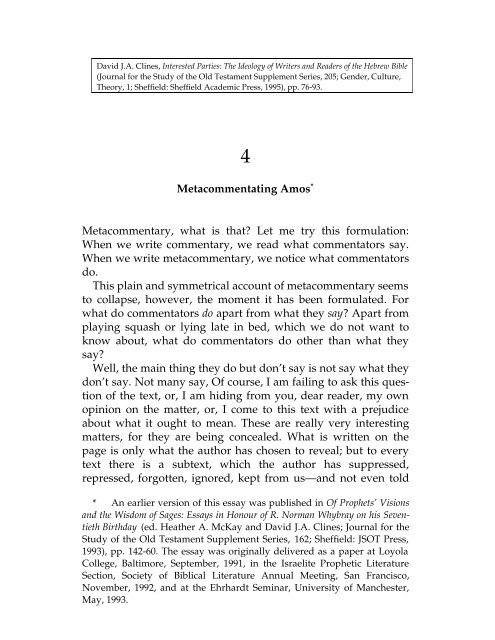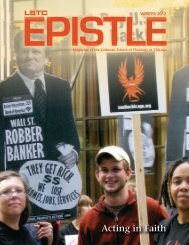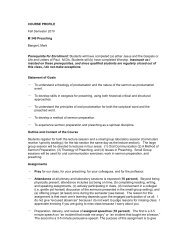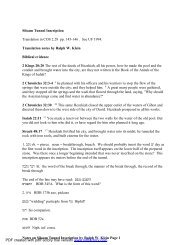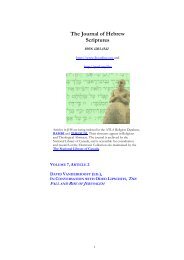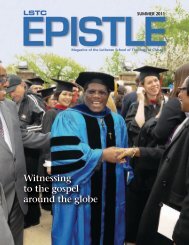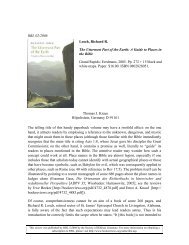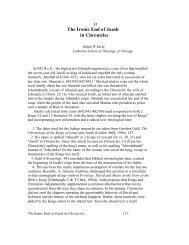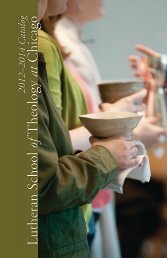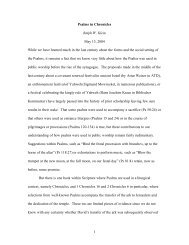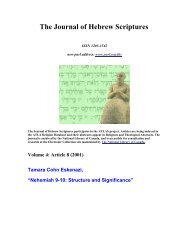Metacommentating Amos* Metacommentary, what is that ... - Fontes
Metacommentating Amos* Metacommentary, what is that ... - Fontes
Metacommentating Amos* Metacommentary, what is that ... - Fontes
You also want an ePaper? Increase the reach of your titles
YUMPU automatically turns print PDFs into web optimized ePapers that Google loves.
David J.A. Clines, Interested Parties: The Ideology of Writers and Readers of the Hebrew Bible(Journal for the Study of the Old Testament Supplement Series, 205; Gender, Culture,Theory, 1; Sheffield: Sheffield Academic Press, 1995), pp. 76-93.4<strong>Metacommentating</strong> Amos *<strong>Metacommentary</strong>, <strong>what</strong> <strong>is</strong> <strong>that</strong>? Let me try th<strong>is</strong> formulation:When we write commentary, we read <strong>what</strong> commentators say.When we write metacommentary, we notice <strong>what</strong> commentatorsdo.Th<strong>is</strong> plain and symmetrical account of metacommentary seemsto collapse, however, the moment it has been formulated. For<strong>what</strong> do commentators do apart from <strong>what</strong> they say? Apart fromplaying squash or lying late in bed, which we do not want toknow about, <strong>what</strong> do commentators do other than <strong>what</strong> theysay?Well, the main thing they do but don’t say <strong>is</strong> not say <strong>what</strong> theydon’t say. Not many say, Of course, I am failing to ask th<strong>is</strong> questionof the text, or, I am hiding from you, dear reader, my ownopinion on the matter, or, I come to th<strong>is</strong> text with a prejudiceabout <strong>what</strong> it ought to mean. These are really very interestingmatters, for they are being concealed. What <strong>is</strong> written on thepage <strong>is</strong> only <strong>what</strong> the author has chosen to reveal; but to everytext there <strong>is</strong> a subtext, which the author has suppressed,repressed, forgotten, ignored, kept from us—and not even told* An earlier version of th<strong>is</strong> essay was publ<strong>is</strong>hed in Of Prophets’ V<strong>is</strong>ionsand the W<strong>is</strong>dom of Sages: Essays in Honour of R. Norman Whybray on h<strong>is</strong> SeventiethBirthday (ed. Heather A. McKay and David J.A. Clines; Journal for theStudy of the Old Testament Supplement Series, 162; Sheffield: JSOT Press,1993), pp. 142-60. The essay was originally delivered as a paper at LoyolaCollege, Baltimore, September, 1991, in the Israelite Prophetic LiteratureSection, Society of Biblical Literature Annual Meeting, San Franc<strong>is</strong>co,November, 1992, and at the Ehrhardt Seminar, University of Manchester,May, 1993.
2 Interested Partiesus <strong>that</strong> it has been kept from us. We innocent members of thepublic, who go on laying out good money on commentaries,need protection against these commentators who are failing totell us <strong>what</strong> it <strong>is</strong> they are failing to tell us. So it becomes anurgent public duty to create a neighbourhood watch committeeof metacommentators who will investigate for us how we arebeing shortchanged.You can search high and low for metacommentary on Amosand Amos commentators, for it <strong>is</strong> a rare scholar who will stepoutside the ideology of the text and notice how severely traditionalcommentary has been constrained by the outlook of thetext. But I did find one, whose femin<strong>is</strong>t perspective gave her avantage point, outside the text, from which the Amos landscapesuddenly took on new and surpr<strong>is</strong>ing contours. Judith Sanderson,in The Women’s Bible Commentary, noticed, as everyone elsehas, how the oracles of Amos vigorously condemn the wealthywomen of Samaria for oppressing the poor, but also, as no oneelse has, <strong>that</strong> they they do not champion the women amongthose poor. And when Amos condemns the wealthy women ofSamaria, because Sanderson <strong>is</strong> a femin<strong>is</strong>t reader she does notautomatically adopt the prophet’s standpoint, but suspects <strong>that</strong>h<strong>is</strong> condemnation <strong>is</strong> yet another scapegoating of women, whoare being blamed now not only for sexual sins (as usual) but forsocial and economic injustices in society as well. 1 ‘A survey ofmodern commentaries on Amos 4.1 reveals the alacrity withwhich women are blamed for societies’ evils, [and] their relativepowerlessness <strong>is</strong> d<strong>is</strong>regarded’, she writes, metacommentatingly. 2She <strong>is</strong> quite right; but her femin<strong>is</strong>t critique <strong>is</strong> only a paradigm forseveral types of critic<strong>is</strong>m <strong>that</strong> can be made. 31 . These women, we must recall, are ‘the pampered darlings of societyin Israel’s royal<strong>is</strong>t culture . . . ruling the society of Israel from behind thescenes with sweet petulant nagging for wealth to support their indolentdalliance’ (James L. Mays, Amos: A Commentary [Old Testament Library;London: SCM Press, 1969], p. 72).2 . Judith Sanderson, ‘Amos’, in The Women’s Bible Commentary (ed.Carol A. Newsom and Sharon H. Ringe; London: SPCK, 1992), pp. 205-209(205-206).3 . I am speaking here only of more or less contemporary commentators.Some older commentators, especially when writing from an avowedlyChr<strong>is</strong>tian perspective, did not feel the same degree of inhibition towards
4. <strong>Metacommentating</strong> Amos 3<strong>Metacommentating</strong> Amos myself, I propose noticing some ofthe things commentators do. First, they adopt the view of thetext regarding the social and economic situation in ancient Israel.Secondly, they adopt the ideology of the text regarding the ex<strong>is</strong>tenceof God and the authenticity of the prophetic vocation.Thirdly, they conceal from their readers <strong>that</strong> th<strong>is</strong> <strong>is</strong> <strong>what</strong> they aredoing.1. Commentators and the Social Critique of AmosI take here the woe against the rich in Amos 6.4-7:Alas for those who lie on beds of ivory,and lounge on their couches,and eat lambs from the flock,and calves from the stall;who sing idle songs to the sound of the harp,and like David improv<strong>is</strong>e on instruments of music;who drink wine from bowls,and anoint themselves with the finest oils,but are not grieved over the ruin of Joseph!Therefore they shall now be the first to go into exile,and the revelry of the loungers shall pass away (NRSV).Let me engage first in a little Sachkritik as a backdrop to readingsome commentators. There <strong>is</strong> undoubtedly a great deal of angerin th<strong>is</strong> passage against the rich in Samaria, and its spirit ofdenunciation against idleness and luxury strikes a chord withdemocratically minded and hard-working readers. But a readerwho has not yet opened a commentary pauses, at least longenough to ask, What exactly <strong>is</strong> the crime of these Samarians forevaluation of their text. Here, for example, <strong>is</strong> Richard S. Cripps: ‘[T]heProphet’s conception of God <strong>is</strong> not perfect. One of the m<strong>is</strong>takes which theChr<strong>is</strong>tian Church has made, resulting in damage impossible to calculate,has been to standard<strong>is</strong>e as eternal and ultimate truth <strong>that</strong> which was but astage—however lofty—in the slow process of its revelation and d<strong>is</strong>covery . . .If any picture of God found within the O.T. had been perfect, then one ofthe reasons for the appearing of Jesus would have become unnecessary’ (ACritical and Exegetical Commentary on the Book of Amos [London: SPCK, 1929],p. 25). However unacceptable today the theory of ‘progressive revelation’may be, at least it enabled its adherents to adopt a critical stance towardtheir texts.
4 Interested Partieswhich they are being threatened with exile? Is there some sin inhaving expensive ivory inlays on your bedframe? (Amos, wepresume, <strong>is</strong> not worried about the fate of elephants.) No doubtmeat of any kind was something of a delicacy in ancient Israel,and these people are eating the meat of choice animals preparedfor the table; but <strong>is</strong> <strong>that</strong> wrong? 4 (Again we can suppose <strong>that</strong>Amos <strong>is</strong> not vegetarian and <strong>that</strong> the text has no fault to find withthe farming methods.) 5 And as for singing idle songs, whoamong the readers of Amos can cast a stone? Has karaoke sud-4 . Oh yes, say Andersen and Freedman (F.I. Andersen and D.N. Freedman,Amos: A New Translation with Introduction and Commentary [AnchorBible, 24A; New York: Doubleday, 1989], p. 562). ‘The details of the menusupplied by v 4b indicate the unconscionable extravagance of the feast . . .The sumptuous prov<strong>is</strong>ion of beef and lamb, and young and tender animalsas well, points to eating on a scale far beyond the means of the ordinaryworker or farmer.’ But are we to read a ‘menu’ in the reference to ‘lambsfrom the flock’ and ‘calves from the stall’? Can we even say <strong>that</strong> Amosmeans <strong>that</strong> both are eaten at the same feast? In any case, would it be‘unconscionable extravagance’ to have two kinds of meat served at the onebanquet? How many unconscionably extravagant restaurants have Andersenand Freedman eaten in, I wonder, and shall we say <strong>that</strong> if Andersenorders lamb and Freedman veal <strong>that</strong> their ‘excessive behavior’ <strong>is</strong> ‘its owncondemnation’ (cf. p. 563)? And, incidentally, exactly how many items areon th<strong>is</strong> ‘menu’ anyway? Either it <strong>is</strong> ‘beef and lamb’ or it <strong>is</strong> ‘young and tenderanimals’, but it <strong>is</strong> not ‘young and tender animals as well’. And <strong>is</strong> theresomething reprehensible in eating lamb rather than mutton, Wienerschnitzelrather than Hungarian goulash? Or <strong>is</strong> it perhaps <strong>that</strong> the referenceto ‘young and tender’ animals—whom we all feel sensitive about—<strong>is</strong> nothingmore than a rhetorical ploy to make the unsuspicious reader take sidesuncritically with the prophet against h<strong>is</strong> opponents?5 . The cryptic remark of Hammershaimb, however, gives pause forthought (Erling Hammershaimb, The Book of Amos: A Commentary [trans.John Sturdy; Oxford: Basil Blackwell, 1970], p. 100). ‘It hurts the feelings ofthe shepherd of Tekoa <strong>that</strong> good animals are used for feasts of th<strong>is</strong> sort’, hesays, and the reader wonders whether Amos perhaps thinks the rich shouldserve d<strong>is</strong>eased animals for dinner, or whether he <strong>is</strong> against them havingopulent feasts but would find no fault with, shall we say, humble feasts—orwhether, perhaps, the ‘shepherd of Tekoa’ entertains tender vegetarianfeelings toward h<strong>is</strong> charges.
4. <strong>Metacommentating</strong> Amos 5denly become a sin, as well as a social d<strong>is</strong>ease? 6 Drinking wineout of bowls instead of cups does admittedly sound greedy, andanointing yourself with the finest (and presumably most expensive)oil rather than bargain basement value-for-money oil <strong>is</strong> certainlyself-indulgent. But how serious <strong>is</strong> self-indulgence? Is it acrime? Is it a sin <strong>that</strong> deserves a sentence of deportation? Doesbeing wealthy and conspicuously consuming renewable naturalresources (wine, oil, mutton and elephant tusks) put you in linefor exile, by any reasonable standards? What are the rich supposedto have been doing? If expensive oil <strong>is</strong> on sale in the marketand you have the money in your pocket to buy it, where <strong>is</strong>the sin?Ah well, say the commentators, it’s more serious than <strong>that</strong>. Theprophetic critic<strong>is</strong>m <strong>is</strong> <strong>that</strong> these people have been indulgingthemselves and at the same time not feeling any pain at the ruin oftheir people (6.7). So, says the metacommentator, if they hadbeen worried about the fate of the nation, it would have been allright for them to be self-indulgent? Well, no, not quite. Actually,they are being hit on both counts. Anyway, says themetacommentator, how does the prophet know <strong>that</strong> they do notfeel pain about their nation? He <strong>is</strong> presumably not invited totheir parties—surely he wouldn’t have the nerve to complainabout the extravagance if he were—so how does he know <strong>what</strong>they feel and don’t feel? Ah well, it’s obvious <strong>that</strong> if they felt anypain they wouldn’t be having parties. Is it? If Rome really <strong>is</strong>burning, <strong>what</strong> else <strong>is</strong> there left to do except fiddle?Would it perhaps be just as true to say, Amos hates the richbecause he <strong>is</strong> not one of them? If he were richer, he would beusing more expensive aftershave himself. It’s easy to condemnother people’s lifestyle and to blame the ills of society on them.But the truth about political and economic d<strong>is</strong>aster and wellbeing<strong>is</strong> probably far too complex to be explained by thebehaviour of individuals. The fate of nations <strong>is</strong> determined muchmore by structural matters, the operation of markets, demographicchanges, d<strong>is</strong>ease, war and chance. To be sure, the personalbehaviour of other people <strong>is</strong> not a negligible factor in everyday6 . The commentators think <strong>that</strong> the phrase ‘like David’ <strong>is</strong> an inauthenticaddition to the text; but they would say <strong>that</strong>, wouldn’t they, because otherw<strong>is</strong>eit would be altogether too hard to say <strong>what</strong> was wrong with it.
6 Interested Partieslife; we would all like our fellow citizens to behave better, andwe know we would feel less envy and less fear if they wereall more like us. But if you are a little country being targetedfor annexation by a big one, as Israel was by Assyria, the highmindednessand moral sensitivity of the average citizen arenot going to make a lot of difference.In short, it would be uncritical of us to accept Amos’s analys<strong>is</strong>of h<strong>is</strong> society, to simply buy the ideology of the text. Somehowwe need to d<strong>is</strong>tance ourselves from the prophetic voice, andrecognize <strong>that</strong> the prophet’s <strong>is</strong> only one voice in h<strong>is</strong> community.The prophet, and the text, have a corner to fight, a position touphold, and we for our part need to identify <strong>that</strong> position, and torelativize it, not so as to d<strong>is</strong>card it but only so as to give it itsproper due. But, hardly surpr<strong>is</strong>ingly, most of the books aboutAmos simply take Amos’s point of view for granted. Amos <strong>is</strong>right, h<strong>is</strong> opponents are wrong; Amos <strong>is</strong> fair; Amos <strong>is</strong> accurate;Amos <strong>is</strong> immensely perceptive; Amos <strong>is</strong> inspired. 77 . Here <strong>is</strong> a striking example of commentators’ incapacity to d<strong>is</strong>tingu<strong>is</strong>hbetween the text and themselves. Andersen and Freedman (Amos,pp. 88-97) have a section on ‘The God of Israel in the Book of Amos’. Itopens by saying, ‘Our purpose <strong>is</strong> to present Amos’ picture of the deity, notours, and to keep it within the thought world of the ancient Near East andthe Bible rather than to translate it into contemporary theological or philosophicallanguage’ (p. 88). That sounds scholarly and objective enough. Butthe section concludes by saying: ‘What it finally comes down to <strong>is</strong> thenature of the God of the Bible, the person with whom the prophet mustdeal (and vice versa) and the person around whom everything turns. Whenall of the superlatives have been exhausted and when all of the authority ormajesty have been accorded and the recognition given to the one incomparabledeity who stands uniquely alone and against everything <strong>that</strong> <strong>is</strong> per<strong>is</strong>hable,vulnerable, corruptible, and the rest, he nevertheless remains a person.That <strong>is</strong> the fundamental and ultimate category in the Bible, as withoutit nothing else matters . . . Once it <strong>is</strong> agreed <strong>that</strong> th<strong>is</strong> God—creator and sustainerof heaven and earth, sole and unique—<strong>is</strong> the God of the Bible andIsrael and Amos and the rest of us, then we may draw closer and ask himwho he <strong>is</strong>, <strong>what</strong> he <strong>is</strong> like, and how things run in th<strong>is</strong> world’ (p. 97). By th<strong>is</strong>point, plainly, we readers are not reading any more about Amos and theancient world, for Amos had no Bible and thus no God of the Bible. Nor arewe reading about Amos’s God when we read <strong>that</strong> God <strong>is</strong> ‘against everything<strong>that</strong> <strong>is</strong> per<strong>is</strong>hable, vulnerable, corruptible’—for are those terms nottrue of humanity, and <strong>is</strong> Amos’s God ‘against’ humanity in general? And
4. <strong>Metacommentating</strong> Amos 7In order to pract<strong>is</strong>e metacommentary, we need to do someclose reading of commentaries. Here <strong>is</strong> my first exhibit:In eighth-century Israel the rich got richer and the poor gotpoorer . . . Amos sketches the well-being enjoyed by the upperclasses in the capital cities, the splendid society <strong>that</strong> was builtupon the m<strong>is</strong>ery of the weak and poor . . . Expensive furniture,indolent ease, succulent food, the sound of music, and extravagantindulgence—so the affluent in Samaria live. Every itemrepresents a luxurious soph<strong>is</strong>tication <strong>that</strong> had been possible inearlier times only for royalty, and remained a world apart fromthe life in the villages. The hollowness of it all only becomesapparent in 6c where th<strong>is</strong> heedless hedon<strong>is</strong>m <strong>is</strong> thrown into reliefagainst the ‘ruin of Joseph’ from which it <strong>is</strong> completelyinsulated. 8Such a rich text repays close reading.In eighth-century Israel the rich got richer and the poor got poorer. 9If it <strong>is</strong> true <strong>that</strong> the rich got richer, can we be sure <strong>that</strong> the poorgot poorer? The gap between rich and poor can widen evenwhile everyone’s standard of living <strong>is</strong> improving. What aboutthose who were neither rich nor poor (? the majority). And inany case, how can we possibly know whether the poverty portrayedin Amos was widespread; how can we know whether therich were in some way responsible for the poverty of the poor orwhether there was some structural cause, which was really noone individual’s fault, for the poverty of a minority?Amos sketches the well-being enjoyed by the upper classes in the capitalcities, the splendid society <strong>that</strong> was built upon the m<strong>is</strong>ery of the weakand poor. 10‘Splendid’ <strong>is</strong> ironic, <strong>is</strong> it not? It <strong>is</strong> not an objective scholarlydescription, <strong>is</strong> it? It <strong>is</strong> actually representing Amos’s (ironic) pointof view in the gu<strong>is</strong>e of a scholarly description, <strong>is</strong> it not? Andwhen, at the end, we start to read about <strong>what</strong> <strong>is</strong> ‘agreed’ and are told <strong>that</strong>‘we’ may ‘draw closer and ask him who he <strong>is</strong>’ (how?), we can feel sure <strong>that</strong>the authors’ trumpeted scholarly interests in the ancient world have beensubmerged by their own ideological beliefs.8 . Mays, Amos, pp. 114, 116.9 . Mays, Amos, p. 114.10 . Mays, Amos, p. 114.
8 Interested Partiesdoes the author literally mean, ‘built upon the m<strong>is</strong>ery of theweak’? It <strong>is</strong> no doubt true enough <strong>that</strong> in a competitive andentrepreneurial society the weakest go to the wall if there are noprogrammes for social care; but we cannot simply assume <strong>that</strong> aprosperous society owes its prosperity to the deprivation of itspoor. 11 You couldn’t say <strong>that</strong> about modern Switzerland, forexample. Should not biblical commentators have to do a coursein economics before they deliver themselves of opinions aboutIsraelite society <strong>that</strong> they proffer in their own voice? Certainly,they shouldn’t be allowed to parrot the prophets and pretendthey are doing scholarly analys<strong>is</strong>.Expensive furniture, indolent ease, succulent food, the sound of music,and extravagant indulgence—so the affluent in Samaria live. Everyitem represents a luxurious soph<strong>is</strong>tication <strong>that</strong> had been possible inearlier times only for royalty, and remained a world apart from the lifein the villages. The hollowness of it all only becomes apparent in 6cwhere th<strong>is</strong> heedless hedon<strong>is</strong>m <strong>is</strong> thrown into relief against the ‘ruin ofJoseph’ from which it <strong>is</strong> completely insulated. 12What authority has the commentator to take th<strong>is</strong> high moraltone? Would he care to compare h<strong>is</strong> own living standards in,let’s say, Richmond, Virginia, with those of the affluent inSamaria of the eighth century BCE? Why does he seem to sneer atthe spread of wealth and soph<strong>is</strong>tication from the court to a widersection of the populace? Why does he not approve, as a loyalAmerican, of the democratization of privilege <strong>that</strong> h<strong>is</strong> textattests? Why does he suggest <strong>that</strong> if the villages cannot havecable TV no one else should? And <strong>what</strong> right has he to talk of‘heedless hedon<strong>is</strong>m’ when he himself, if he <strong>is</strong> anything like mostof us academics, has probably never contributed to the grossnational product, having devoted himself to the self<strong>is</strong>h pursuitof non-practical knowledge, and being parasitic, like mostscholars, upon the wealth-creating sectors of the community for11 . Mays actually says <strong>that</strong> ‘The economic base of such luxury <strong>is</strong>violence . . . against the poor’ (p. 117). What economic theory, we suddenlywonder, does Mays subscribe to? Can it be perhaps <strong>that</strong> he <strong>is</strong> a Marx<strong>is</strong>t? Or<strong>is</strong> th<strong>is</strong> not a serious economic and political remark, but only preacher’srhetoric?12 . Mays, Amos, p. 116.
h<strong>is</strong> own bread and butter?And here <strong>is</strong> my second exhibit:4. <strong>Metacommentating</strong> Amos 9The prophet brutally smashes the attraction of these banquets ofthe chosen few in society which go on long into the night, by amournful hoy [‘woe’]. He d<strong>is</strong>turbs the fastidious and dubiousatmosphere of these ceremonies where the other man’s fate <strong>is</strong>completely d<strong>is</strong>regarded . . . There are some who profit at theexpense of the community; they enjoy life while the rest weep inm<strong>is</strong>ery. Amos does not desire a prosperity founded on oppression.That <strong>is</strong> why th<strong>is</strong> fastidious set will be deported and th<strong>is</strong>refined but rotten society will van<strong>is</strong>h away. 13From whose point of view does Amos ‘brutally smash theattraction’ of these banquets? Not <strong>that</strong> of the readers, presumably,since they will not be very attracted to a party whereeveryone has long since gone home. It will be <strong>that</strong> of the partygoersthemselves; Amos thinks the national situation too seriousfor people to be enjoying themselves. And so, apparently, doesthe commentator. Without thinking, without questioning, heassumes <strong>that</strong> if Amos says it, it must be right. And <strong>what</strong> <strong>is</strong> more,it must be effective. So if Amos stands outside the window andshouts hoy, ‘woe’ (remember, he hasn’t been invited to theparty), everyone inside finds the party entirely spoiled, itsattraction smashed and its fastidious atmosphere fatallyd<strong>is</strong>turbed. Really?Amos doesn’t desire a prosperity founded on oppression, saysthe commentator, no doubt quite correctly. But he omits to mention<strong>that</strong> neither do the wealthy of Samaria, in all probability. Noone except the most depraved and cynical people walk aroundboasting about founding their prosperity on oppression. So thedifference between Amos and those he opposes <strong>is</strong> not <strong>that</strong> he <strong>is</strong>evidently in the right and they are evidently in the wrong; it <strong>is</strong> adifference in conviction about <strong>what</strong> <strong>is</strong> and <strong>is</strong> not fair dealing.Perhaps Amos <strong>is</strong> in the right, but perhaps he <strong>is</strong> not. All I am saying<strong>is</strong> <strong>that</strong> to jump to the conclusion <strong>that</strong> he <strong>is</strong> in the right <strong>is</strong> not ascholarly procedure; it <strong>is</strong> simply the reflex of an uncritical reli-13 . R. Martin-Achard, A Commentary on the Book of Amos, in R. Martin-Achard and S. Paul Re’emi, God’s People in Cr<strong>is</strong><strong>is</strong> (International TheologicalCommentary; Edinburgh: Handsel Press, 1984), pp. 48, 49.
10 Interested Partiesgious belief <strong>that</strong> assumes <strong>that</strong> <strong>what</strong> a prophet in the Bible saysmust be the truth. And yet <strong>that</strong> very Bible gives us plenty of evidenceabout the ex<strong>is</strong>tence of false prophets in ancient Israel, andabout the capacity for error even of those who are genuine.2. Commentators and the Religious Ideology of AmosAmos, or the book of Amos, <strong>is</strong> full of religious ideology (ortheology, as we tend to call it when we are not being critical butgiving our implicit assent to it). The question the metacommentatorasks <strong>is</strong> whether the commentators on Amos recognizeideology when they see it. Here are some ideological statementsyou find in the book and in the commentaries.a. The Prophetic Sense of VocationThe book of Amos <strong>is</strong> founded on the belief <strong>that</strong> Amos theprophet had actually been spoken to by God. Th<strong>is</strong> <strong>is</strong> <strong>what</strong> heclaims when he says, ‘Thus says Yahweh’. It <strong>is</strong> an amazing claim,and a shocking one. Most of our acquaintances, we ought torecall, think <strong>that</strong> people who claim to hear voices from the skyshould be locked up. Commentators are hardy souls, however,not easily alarmed, and generous of spirit. How else to explainthe fact <strong>that</strong> almost every textbook on Amos accepts Amos’sclaim, the book’s ideology?Here <strong>is</strong> the commentary of <strong>that</strong> learned German, Hans WalterWolff. Under the heading ‘The Man Amos’ he tells us, with duescholarly caution:When Amos was born and when he died, we do not know. Howold he was at the time of h<strong>is</strong> appearance around 760 BC remainshidden from us . . . Amos was not a native of the northern kingdom,but a Judean come from Tekoa . . . As a sheep breeder (and assuch to be d<strong>is</strong>tingu<strong>is</strong>hed clearly from a lowly shepherd) he wasprobably not exactly poor. 14‘Probably not exactly’; it <strong>is</strong> the very quintessence of scholarlyreserve. But then, in the very next paragraph, scholarship <strong>is</strong>thrown to the winds and pious statements of belief in the intangibleand unknowable are paraded as if they belonged to the14 . Hans Walter Wolff, Joel and Amos: A Commentary on the Books of theProphets Joel and Amos (Hermeneia; Philadelphia: Fortress Press, 1977), p. 90.
same world of d<strong>is</strong>course:4. <strong>Metacommentating</strong> Amos 11It was the hand of Yahweh which uprooted him temporarily fromh<strong>is</strong> familiar realm and made him break the silence of the w<strong>is</strong>e inevil times (5.13). Whenever he reveals the bas<strong>is</strong> for h<strong>is</strong> propheticappearance, he points exclusively to Yahweh’s irres<strong>is</strong>tible ins<strong>is</strong>tence. . . To those who attribute h<strong>is</strong> appearance to h<strong>is</strong> own brazenself-will, he directs the question whether then terror at the suddenroar of a lion could be self-willed; it <strong>is</strong> Yahweh’s address <strong>that</strong> has
12 Interested Partiesirres<strong>is</strong>tibly impelled him to make proclamation (3.8) . . . [B]ecausehe has been constrained by Yahweh to proclaim h<strong>is</strong> judgment,Amos also exposes Israel’s guilt as reason for th<strong>is</strong> judgment. 15So there <strong>is</strong> a God, and h<strong>is</strong> name <strong>is</strong> Yahweh, and Yahweh didindeed speak to Amos, just as Amos claims, and I am telling youth<strong>is</strong> with all my authority as a German professor. 16 There werethose, no doubt, in Amos’s own time who ‘attributed h<strong>is</strong> appearanceto h<strong>is</strong> own brazen self-will’—though the text, if I read itrightly, tells us only of those who demanded <strong>that</strong> Amos go homeand stop prophesying at Bethel; whether they implied <strong>that</strong> it wasnot God who brought Amos to Bethel but Amos’s own self-will<strong>is</strong> rather harder to determine. Anyway, says Wolff, Amos has thebetter of <strong>that</strong> exchange because he can whip out the lines, ‘Thelion has roared; who will not fear? The Lord GOD has spoken;who can but prophesy?’ (3.8). Somehow <strong>that</strong> proves <strong>that</strong> Amos <strong>is</strong>in the right, <strong>that</strong> he has been sent by God, <strong>that</strong> there <strong>is</strong> a God,and all the rest of it. And any modern readers, by the sametoken, who attribute Amos’s appearance at Bethel to h<strong>is</strong> ownbrazen self-will—or even say, more modestly, <strong>that</strong> they supposeAmos just thought it was a good idea to go to Bethel and say<strong>what</strong> he believed—they too stand condemned by the prophethimself. Amos’s rhetorical question <strong>is</strong> unanswerable. No matter<strong>that</strong> it <strong>is</strong> only a claim. No matter <strong>that</strong> you can’t prove the validityof one claim by making another. Amos has been impelled byGod, he has been constrained by Yahweh; th<strong>is</strong> <strong>is</strong> h<strong>is</strong>torical fact.No, we do not know when he was born, and no, we cannot besure whether he was rich or poor, but yes, we do know he wassent by God and <strong>that</strong> he was in the right and Amaziah was in thewrong.15 . Wolff, Joel and Amos, p. 91.16 . American professors are no different, of course. Says Mays, openingh<strong>is</strong> section on ‘The Message’ of Amos: ‘Amos was Yahweh’s messenger toIsrael’ (Amos, p. 6)—which six words, being interpreted, mean, Yes, there <strong>is</strong>a Yahweh, and yes, Amos <strong>is</strong> h<strong>is</strong> authentic prophet and Amaziah <strong>is</strong> a fraud; Iknow, and I am telling you. It has all the critical finesse and scholarly sobrietyof the muezzin’s call to prayer: There <strong>is</strong> no god but God and Muhammad<strong>is</strong> the prophet of God. There <strong>is</strong> of course nothing wrong about themuezzin’s claim, especially if you are a believer (I don’t d<strong>is</strong>believe itmyself, actually); it’s just <strong>that</strong> it’s not critical scholarship.
4. <strong>Metacommentating</strong> Amos 13b. Inner-Religious ConflictThere’s another thing, the matter of Amaziah. I don’t mindadmitting <strong>that</strong> my own antipodean sympathies and prejudicesevery time are with the rough-hewn prophet from down underby compar<strong>is</strong>on with the smooth authoritarian toady, the priestAmaziah. But I can’t help thinking, But th<strong>is</strong> Amaziah wasn’t anathe<strong>is</strong>t, he wasn’t a pagan, he wasn’t an irreligious man. He worshippedthe same God as Amos, and he and Amos believed inalmost all the same things. From my perspective, from the perspectiveof an Assyrian, from the perspective of almost anyonewho <strong>is</strong> not caught up in the political and religious situation ofthe eighth century BCE, the conflict between them was no morethan a minor sectarian d<strong>is</strong>pute. And since we only have Amos’sside of it—and <strong>that</strong>, moreover, <strong>is</strong> couched in the colourfulrhetoric of poetry—how can we ever decide where right andwrong lay? and <strong>what</strong>, for <strong>that</strong> matter, would right and wrong inmatters of th<strong>is</strong> kind actually be?c. Knowledge versus BeliefLet me try a rather more subtle example, th<strong>is</strong> time from theDan<strong>is</strong>h scholar Erling Hammershaimb. The reader <strong>is</strong> invited todetect the point at which the scholarship stops and the religiousassumptions begin:Amos not only knows the land of Israel . . . ; he <strong>is</strong> also familiar withh<strong>is</strong> people’s h<strong>is</strong>tory and the accounts of Yahweh’s acts of kindnessto the people. For him Yahweh <strong>is</strong> the creator God, who hasled the people out of Egypt and preserved them during the fortyyears of wandering in the wilderness, and then defeated theAmorites in the land of Canaan, so <strong>that</strong> Israel could dwell there(2.9ff.; Amos 9.7). He knows too <strong>that</strong> Yahweh has continuouslycared for the spiritual well-being of the people, and sent prophetsto speak to the people and remind them of h<strong>is</strong> commandments(Amos 2.11). Amos does not therefore regard himself as proclaimingsomething completely new . . . 17Amos <strong>is</strong> familiar with h<strong>is</strong> people’s h<strong>is</strong>tory—<strong>that</strong> <strong>is</strong> an uncontroversialinference from the text of the book itself (provided, ofcourse, <strong>that</strong> we leave aside the trifling matter of whether theauthor of the book <strong>is</strong> actually the prophet Amos). He knows the17 . Hammershaimb, Amos, p. 12.
14 Interested Parties‘accounts’ of the national god’s deeds; no problem there. ‘Forhim’ Yahweh <strong>is</strong> th<strong>is</strong> and <strong>that</strong>—which <strong>is</strong> the scholarly way ofrepresenting the views of others without at the same time committingoneself to them. But when we read, ‘He knows too <strong>that</strong>Yahweh has continuously cared for . . . h<strong>is</strong> people’, we are boundto ask, ‘Knows, does he?’ How can he know something <strong>that</strong> <strong>is</strong> nota fact? He knows the tradition <strong>that</strong> Yahweh has cared for h<strong>is</strong>people, but Hammershaimb cannot say <strong>that</strong> Amos ‘knows’ itunless Hammershaimb believes it. He cannot mean <strong>that</strong> Amosknows it but Amos might be wrong; we don’t say someone‘knows’ it <strong>is</strong> four o’clock if we ourselves believe it <strong>is</strong> six. Hammershaimb,though he hasn’t done anything very wicked, has leth<strong>is</strong> guard slip nevertheless. He persuaded us at the beginning ofthe paragraph <strong>that</strong> he was speaking purely as an ‘objective’scholar, d<strong>is</strong>passionately describing the views of Amos, but bythe third sentence he let us see <strong>that</strong> in fact he was not a d<strong>is</strong>interestedobserver of Amos at all, but an adherent and promoter ofAmos’s theological ideas. Any reader who thinks <strong>that</strong> such ananalys<strong>is</strong> of the scholar’s religious commitment <strong>is</strong> hypercriticalmight like to consider how the sentences would sound if we substitutedZeus for Yahweh, and, shall we say, Aeschylus forAmos. For Aeschylus, Zeus <strong>is</strong> the creator. Fine, we say. Heknows too <strong>that</strong> Zeus has continuously sustained the Greekpeople. Has he indeed?, we cannot help asking.d. The Contrast between ‘True’ and ‘False’ ProphetsTake another example, the matter of the terms in which the contrastbetween Amos and the ‘professional prophets’ <strong>is</strong> cast. Inins<strong>is</strong>ting he <strong>is</strong> not a prophet nor a prophet’s son, Amos, saysHammershaimb, ‘means <strong>that</strong> he <strong>is</strong> not a prophet by profession,does not belong to a band of prophets, and has not uttered h<strong>is</strong>prophecies for financial gain like the professional prophets’. 18Does th<strong>is</strong> mean <strong>that</strong> Amos claims <strong>that</strong> the ‘professional prophets’utter their prophecies for financial gain, or <strong>that</strong> Hammershaimbbelieves <strong>that</strong> the ‘professional prophets’ did so? Given <strong>that</strong> sentencealone, it <strong>is</strong> hard to tell. Certainly, when we read <strong>that</strong>‘Amaziah himself forbids Amos to prophesy in the NorthernKingdom, and orders him out, as being a professional prophet18 . Hammershaimb, Amos, p. 11.
4. <strong>Metacommentating</strong> Amos 15who had appeared there for the sake of gain’, 19 we have nodoubt <strong>that</strong> the point of view being reported <strong>is</strong> <strong>that</strong> of Amaziahand not of the modern critic. But when we read, a few pages on,<strong>that</strong> Amos ‘w<strong>is</strong>hes to protest at being included in the same classas the professional prophets, whose preaching was not dictatedby Yahweh, but by the w<strong>is</strong>h to earn money’, 20 the relative clausebeginning ‘whose preaching’ can only be taken as the words ofthe scholar. 21 It <strong>is</strong> the scholar who advances the view <strong>that</strong> theprophets Amos d<strong>is</strong>sociates himself from are false prophets (‘notdictated by Yahweh’), and not even sincerely m<strong>is</strong>taken, but corrupt,and motivated only by the desire for money. Amos himself(the character Amos in the text, I mean) never says <strong>that</strong> otherprophets are false prophets, and never hints <strong>that</strong> the preachingof prophets and the sons of prophets <strong>is</strong> dictated by the w<strong>is</strong>h toearn money. He only says <strong>that</strong> he <strong>is</strong> not a ‘professional’prophet. 22 As far as we know, he may have nothing against pro-19 . Hammershaimb, Amos, p. 113.20 . Hammershaimb, Amos, p. 117.21 . It <strong>is</strong> the comma after ‘professional prophets’ <strong>that</strong> proves it: if therehad been no comma, the ‘whose preaching’ clause could be understood asdefining the professional prophets, and in <strong>that</strong> case could be representingthe perspective of Amos; but the comma turns the clause into a descriptiveclause, which can only represent the perspective of Hammerschaimb. Thed<strong>is</strong>tinction <strong>is</strong> the same as <strong>that</strong> between ‘<strong>that</strong>’, which introduces a definingclause, and ‘which’, which introduces a descriptive clause. If it <strong>is</strong> protested<strong>that</strong> the comma may have been introduced by the translator, I offer myapologies to Hammerschaimb, and fasten the blame on the translator. Andif <strong>is</strong> protested <strong>that</strong> I am making a lot of fuss about a comma, I will reply<strong>that</strong>, in th<strong>is</strong> case, on <strong>that</strong> comma hangs the difference between giving theimpression <strong>that</strong> one <strong>is</strong> uncritically adopting the opinions of Amos or beinga critical scholar. Real critical scholars will go to any lengths to prevent acomma cheating them of their reputation.22 . He may even be saying <strong>that</strong> he was not a professional prophet, but he<strong>is</strong> now. If Yahweh has taken him from following the flock, he <strong>is</strong> not being ashepherd any longer, <strong>is</strong> he? And if he <strong>is</strong> not earning a living from shepherding,<strong>is</strong> he perhaps earning it from prophesying?But where does the idea of ‘professional prophet’ come from, anyway?Does nabi mean <strong>that</strong>? Was Ezekiel, who was a professional priest, also aprofessional prophet? And in any case, <strong>is</strong> Amaziah implying <strong>that</strong> Amos <strong>is</strong>prophesying for the sake of income, and <strong>is</strong> he urging Amos to earn h<strong>is</strong> livingfrom prophesying elsewhere, or does ‘eat bread’ mean <strong>what</strong> it means
16 Interested Partiesfessional prophets; the sum and substance of h<strong>is</strong> reply toAmaziah might well be simply h<strong>is</strong> affirmation of the genuinenessof h<strong>is</strong> own calling. And we too might do well to think twicebefore assuming <strong>that</strong> ‘professional’ prophets are in the businessof prophesying just for the money; Hammershaimb was a professionalbiblical scholar, but we wouldn’t dream of saying <strong>that</strong>he was motivated by the w<strong>is</strong>h to earn money.e. Pun<strong>is</strong>hmentIt <strong>is</strong> an essential element in the text’s ideology <strong>that</strong> sin should bepun<strong>is</strong>hed. The book opens with a powerful indictment of thenations <strong>that</strong> surround Israel for their crimes, and a repeatedthreat of pun<strong>is</strong>hment. As each nation comes into focus, theprophetic message <strong>is</strong>: ‘For three transgressions of X and for four,I will not turn away the pun<strong>is</strong>hment thereof ’ (e.g. 1.3). 23 Any‘departure’ from God <strong>is</strong> v<strong>is</strong>ited with pun<strong>is</strong>hment, as in the catalogueof d<strong>is</strong>asters in ch. 4 (famine and plague and war) <strong>that</strong>failed to make Israel ‘return’ to the Lord. And the repeated‘therefore’ <strong>is</strong> a further sign of the prophetic ideology; the familiarpattern <strong>is</strong>: an account of a sin, followed by the ‘therefore’ <strong>that</strong>introduces the pun<strong>is</strong>hment. The denunciation of the rich <strong>that</strong> wehave already looked at, ‘Woe to those who lie on beds of ivory’,likew<strong>is</strong>e comes to a conclusion with such a ‘therefore’:‘ Therefore they shall be the first of those to go into exile’ (6.7).And to the sin of Amaziah in forbidding Amos to prophesy,there <strong>is</strong> the same ‘therefore’ of pun<strong>is</strong>hment: ‘Therefore thus saysthe LORD, Your wife shall be a prostitute in the city . . . ’(7.17)—which Amos, interestingly enough, thinks of as apun<strong>is</strong>hment of him.What do the commentators make of th<strong>is</strong> ideology? They neverd<strong>is</strong>cuss it; they only repeat it. They agree with Amos <strong>that</strong> bothIsrael and the surrounding nations deserve to be pun<strong>is</strong>hed, and <strong>that</strong>such pun<strong>is</strong>hment should be capital. Here, for example, <strong>is</strong> JohnBright:everywhere else, ‘eat’, not ‘earn’? In sum, has the whole idea of ‘gain’ perhapsbeen entirely imported into the text?23 . Actually, the Hebrew text does not have a word for ‘pun<strong>is</strong>hment’,but it <strong>is</strong> obvious—from the ideology of the book as a whole, really—<strong>that</strong> itcan only be pun<strong>is</strong>hment <strong>that</strong> <strong>is</strong> inevitable after a crime.
4. <strong>Metacommentating</strong> Amos 17Amos’s message was a devastating attack on the social evils of theday, particularly on the heartlessness and d<strong>is</strong>honesty with whichthe rich had ground down the poor . . . , but also on the immoralityand the careless pursuit of luxury which had sapped the nationalcharacter . . . —all of which he viewed as sins <strong>that</strong> Yahweh wouldsurely pun<strong>is</strong>h. 24The metacommentator <strong>is</strong> bound to ask whether modern scholarsare aware of <strong>what</strong> they are doing. They are adopting the view,and presenting it as their own, <strong>that</strong> the best way, or perhaps theonly way, of dealing with heartlessness, d<strong>is</strong>honesty, immoralityand luxury (to adopt Bright’s terms) <strong>is</strong> to wipe the offenders outof ex<strong>is</strong>tence. The metacommentator observes (but <strong>is</strong> notsurpr<strong>is</strong>ed) how, when it <strong>is</strong> the deity who <strong>is</strong> pun<strong>is</strong>hing, highmindedcommentators who would not harm a fly themselvessuddenly join the hanging and flogging brigade and think nopun<strong>is</strong>hment too severe.Nor do the commentators seem to notice the conflict betweenthe apparent justice of pun<strong>is</strong>hing those who deserve it and theobvious injustice of pun<strong>is</strong>hing those who do not. Mays, forexample, can write <strong>that</strong> the ‘prophecy of Amos can be heard asYahweh’s response to their [the poor’s] cry, for the weak andpoor are the special objects of Yahweh’s compassion andconcern’; 25 but at the same time he can say <strong>that</strong> ‘the cons<strong>is</strong>tentburden of h<strong>is</strong> [Amos’s] oracles <strong>is</strong> to announce the d<strong>is</strong>aster <strong>that</strong>will fulfil Yahweh’s decree of an end for h<strong>is</strong> people’. 26 Hedoesn’t seem to notice <strong>that</strong> Yahweh can’t be very compassionateto the poor if he intends them to be carried into exile because ofthe wrongdoing of their leaders, or <strong>that</strong> the prophet’s demandfor justice does not seem to apply to the deity. 2724 . John Bright, A H<strong>is</strong>tory of Israel (London: SCM Press, 3rd edn, 1981),p. 262.25 . Mays, Amos, p. 10.26 . Mays, Amos, p. 9.27 . Here <strong>is</strong> a typical commentatorial utterance on the subject: ‘The conceptionof Yahweh which Amos entertains <strong>is</strong> <strong>that</strong> of a god of justice ...[Amos] makes the idea the very centre of h<strong>is</strong> conception of God ... Righteousnessbeing a vital element in Yahweh’s character, he not only willdemand it in those who profess to be h<strong>is</strong> followers, but will also enforce thedemand ... It <strong>is</strong> a demand for justice, which, in its simplest and most naturalform, includes honesty, integrity, purity, and humanity ... It demands the
18 Interested PartiesThese commentators surely know <strong>that</strong> they have many optionsopen to them when they themselves are wronged by someoneelse, and <strong>that</strong> inflicting injury on others <strong>is</strong> either a raw instinctiveimpulse or else a cruel cold-blooded dec<strong>is</strong>ion <strong>that</strong> they come toat the end of their tether, feel guilty about, but try to justifynevertheless on some rational grounds. But once they startcommentating on Amos they accede to Amos’s simple moraldefeat<strong>is</strong>m. Not one of them has the courage—or the intellectualcapacity—to extract himself (they are all males) from the ideologyof the text and to pronounce a moral judgment upon theprophecy. To be sure, the future was very much as the prophecysays—whether it predicted it or wrote it up in hindsight. Thingswere awful, for rich and poor alike. But it <strong>is</strong> even more awful toascribe the destruction of a state and the forceable deportation ofits citizens to an avenging God. If <strong>that</strong> <strong>is</strong> how a believer findshimself or herself impelled to conclude, <strong>that</strong> it <strong>is</strong> a terrible thingto fall into the hands of the living God, the metacommentatorcan respect <strong>that</strong>. But to affirm it casually, to pretend <strong>that</strong> it <strong>is</strong>unproblematic—<strong>that</strong> <strong>is</strong> not scholarly, it <strong>is</strong> not even human.Must the metacommentator be so wasp<strong>is</strong>h?, readers are likely tobe asking themselves. Does everything have to become sopersonal, and <strong>is</strong> it truly scholarly to question the motives andinterests of our colleagues, as I have been doing throughout th<strong>is</strong>paper?The answer <strong>is</strong>, Yes. It must be, once we admit <strong>that</strong> we are notall engaged in some objective quest for determinate meanings,and <strong>that</strong> our ideologies, our locations, our interests and our personalitiesdetermine our scholarship—and separate us from oneanother. Strip away the bonhomie <strong>that</strong> passes for scholarly interutmostconsideration of the poor and weak,—moral justice’ (William RaineyHarper, A Critical and Exegetical Commentary on Amos and Hosea[International Critical Commentary; Edinburgh: T. & T. Clark, 1905],pp. cxvii-cxviii, cxx). It simply does not occur to th<strong>is</strong> commentator to askwhether in Amos’s conception th<strong>is</strong> moral standard applies to Yahweh, andwhether the threats of famine, fire, exile and the like can be accommodatedwith ‘the utmost consideration of the poor and weak’. At least Harper doesnot try to argue <strong>that</strong> the pun<strong>is</strong>hments are ‘a token and proof of divine concernand commitment’ (Andersen and Freedman, Amos, p. 383), a d<strong>is</strong>ingenuousclaim if ever there was one.
4. <strong>Metacommentating</strong> Amos 19change in the corridors of the international congresses, and wefind <strong>that</strong> there <strong>is</strong> a lot we don’t like, don’t approve of, and willnot stand for, in our colleagues, a lot <strong>that</strong> has yet to be broughtinto the light, taken the measure of, and fought over. Managingpersonal conflict within the academy may well be the new skill,harder still than Assyriology or deconstruction, <strong>that</strong> scholars willneed to acquire in th<strong>is</strong> decade. 2828 . Examples of the ‘new brutality’, as we might term it, in biblicalscholarship, may be found in the recent pages of the Journal of Biblical Literature;witness the paper of Ben F. Meyer against E.P. Sanders (‘A Caricatureof Joachim Jeremias and h<strong>is</strong> Scholarly Work’, Journal of Biblical Literature110[1991], pp. 451-62), and <strong>that</strong> of Meir Sternberg against Danna Fewell andDavid Gunn (‘Biblical Poetics and Sexual Poetics: From Reading toCounter-Reading’, Journal of Biblical Literature 111 [1992], pp. 463-88). Ineither welcome it nor deplore it; the tensions <strong>that</strong> come to the surface insuch acerbic reviews are already in ex<strong>is</strong>tence, and no good can come ofsuppressing them.


